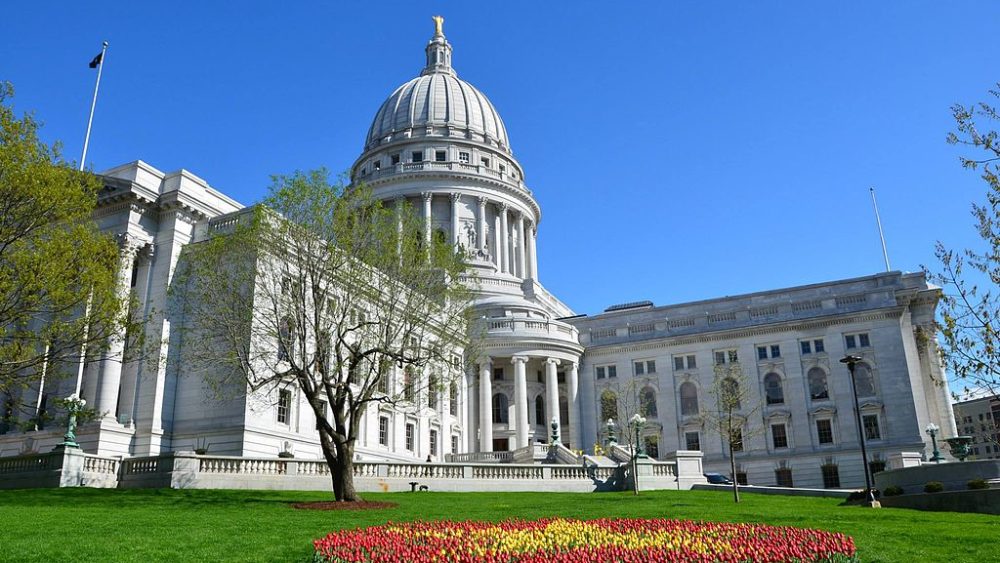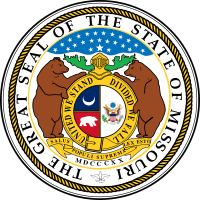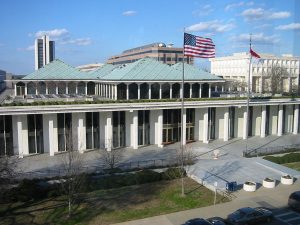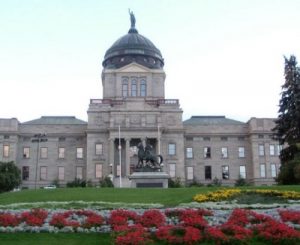September 22, 2022 •
Wisconsin Governor Calls Special Session

Wisconsin State Capitol Building
Gov. Tony Evers signed Executive Order 175 calling for a special session of the Wisconsin Legislature to begin Tuesday, October 4 to consider and act upon two proposals allowing voters to introduce ballot initiatives and amending the constitution to create […]
Gov. Tony Evers signed Executive Order 175 calling for a special session of the Wisconsin Legislature to begin Tuesday, October 4 to consider and act upon two proposals allowing voters to introduce ballot initiatives and amending the constitution to create a statewide binding referendum process that would allow voters to propose laws and constitutional amendments and repeal state laws.
Currently, any constitutional amendment must be passed by two consecutive legislatures before it is placed on a ballot for voters.
September 26, 2018 •
Clean Missouri Amendment Will Appear on November Ballot
The Missouri Supreme Court declined to take on the Clean Missouri ballot initiative case, which means it will appear as an amendment on the ballot this November. The amendment focuses on ethics reform and state redistricting, and it was challenged […]
 The Missouri Supreme Court declined to take on the Clean Missouri ballot initiative case, which means it will appear as an amendment on the ballot this November.
The Missouri Supreme Court declined to take on the Clean Missouri ballot initiative case, which means it will appear as an amendment on the ballot this November.
The amendment focuses on ethics reform and state redistricting, and it was challenged because it possibly violated a provision of the Missouri Constitution that limits the scope of initiative petitions and sought to mislead voters.
A trial court agreed, but an appellate court in Kansas City upheld Clean Missouri because all the proposed changes are included under the subject Legislature reform.
August 24, 2018 •
North Carolina Begins Second Special Session
The North Carolina General Assembly was called into special session yesterday to begin today, August 24, in order rewrite ballot amendment language to shift appointment powers from the governor to the Legislature. Speaker Tim Moore said legislators plan to make […]
 The North Carolina General Assembly was called into special session yesterday to begin today, August 24, in order rewrite ballot amendment language to shift appointment powers from the governor to the Legislature.
The North Carolina General Assembly was called into special session yesterday to begin today, August 24, in order rewrite ballot amendment language to shift appointment powers from the governor to the Legislature.
Speaker Tim Moore said legislators plan to make revisions “because the proposals provide a popular bipartisan balance in our state government that will benefit the people of North Carolina.”
This is the second special session this summer to address the ballot language.
July 16, 2018 •
Montana Lawmakers Reject Special Session
Montana legislative leaders failed to persuade a majority of lawmakers to hold a special session this week to address two ballot initiatives. Some lawmakers expressed concern with the initiatives, which address mine cleanup plans and raising the state’s tobacco tax […]
 Montana legislative leaders failed to persuade a majority of lawmakers to hold a special session this week to address two ballot initiatives.
Montana legislative leaders failed to persuade a majority of lawmakers to hold a special session this week to address two ballot initiatives.
Some lawmakers expressed concern with the initiatives, which address mine cleanup plans and raising the state’s tobacco tax to extend Montana’s Medicaid expansion program beyond 2019, and they want to offer voters alternatives.
76 votes were needed in order to hold the special session, but only 45 lawmakers voted in favor, while 71 opposed the proposed session.
July 2, 2018 •
Montana Legislators to Hold Vote to Have Special Session
Ballots are being sent to Montana lawmakers to see if they would like to hold a special session this month to address concerns over ballot initiatives addressing mine regulations and tobacco taxes to extend the state’s Medicaid expansion program. Some […]
 Ballots are being sent to Montana lawmakers to see if they would like to hold a special session this month to address concerns over ballot initiatives addressing mine regulations and tobacco taxes to extend the state’s Medicaid expansion program.
Ballots are being sent to Montana lawmakers to see if they would like to hold a special session this month to address concerns over ballot initiatives addressing mine regulations and tobacco taxes to extend the state’s Medicaid expansion program.
Some lawmakers have expressed concerns about the measures and would like to offer competing initiatives to give voters alternative policy choices.
The ballots are due July 15, and if the majority of lawmakers vote in favor, the special session would begin the following day.
June 8, 2016 •
Five Citizen’s Initiatives to Hit Maine’s November Ballot
A record five citizen’s initiatives are set to hit the November ballot. If all five initiatives pass, ranked-choice voting would replace the current election system (IB 2), a tax surcharge would be imposed on certain households to increase funding for […]
 A record five citizen’s initiatives are set to hit the November ballot.
A record five citizen’s initiatives are set to hit the November ballot.
If all five initiatives pass, ranked-choice voting would replace the current election system (IB 2), a tax surcharge would be imposed on certain households to increase funding for public schools (IB 3), minimum wage would be raised to $12 an hour by 2020, background checks would be required for private gun sales (IB 5), and marijuana use would be legal (IB 6).
Ranked-choice voting ensures the winning candidate, in a multi-candidate race, receives the majority vote because voters rank candidates in order of preference. If a candidate does not receive 50 percent of first-choice votes, then the lowest scoring candidate is eliminated and votes are retabulated.
Despite the Legislature’s intention to kill the bill version of IB 2 in March, voters have the opportunity to pass the initiative this November, much like the passage of IB 1 in November 2015, which revamped campaign finance laws.
If successful, Maine would be the first state to institute ranked-choice voting.
November 15, 2010 •
Next Stop: U.S. Supreme Court? Colorado Campaign Finance Case Appears Ripe for Appeal
Federal Appellate Court Finds Colorado Campaign Finance Limits on Small Groups Unconstitutional
 The 10th Circuit Court of Appeals determined Colorado’s voter-approved campaign reporting requirement for small groups promoting ballot initiatives to be unconstitutional. The case stems from a challenge by a group of homeowners who failed to register as an issue committee upon becoming a group of two or more persons and accepting or making contributions or expenditures in excess of $200. Six homeowners had raised and spent less than $1,000 fighting a ballot question concerning the annexation of their subdivision, Parker North, into the town of Parker, Colorado.
The 10th Circuit Court of Appeals determined Colorado’s voter-approved campaign reporting requirement for small groups promoting ballot initiatives to be unconstitutional. The case stems from a challenge by a group of homeowners who failed to register as an issue committee upon becoming a group of two or more persons and accepting or making contributions or expenditures in excess of $200. Six homeowners had raised and spent less than $1,000 fighting a ballot question concerning the annexation of their subdivision, Parker North, into the town of Parker, Colorado.
Plaintiff’s attorney Steve Simpson, a member of the Arlington, Virginia-based Institute for Justice, has stated this case is the first ruling in the nation wherein reporting requirements for issue committees have been linked to the First Amendment and deemed unconstitutional. Simpson also added the decision in this case signals a split with another appellate court, causing the case to be ripe for appeal before the U.S. Supreme Court.
You can read the full text of the opinion here.
State and Federal Communications, Inc. provides research and consulting services for government relations professionals on lobbying laws, procurement lobbying laws, political contribution laws in the United States and Canada. Learn more by visiting stateandfed.com.

